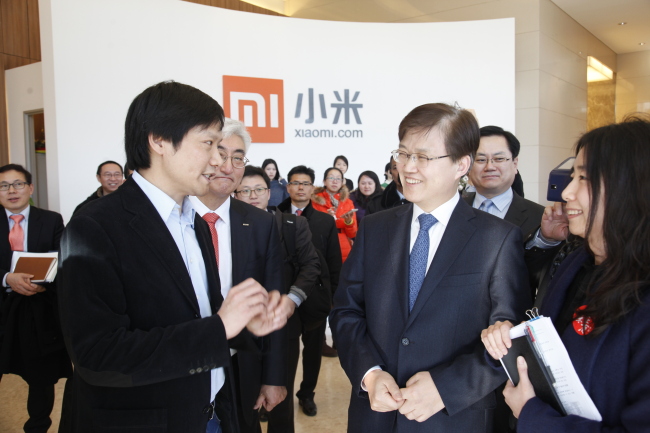Top management of Xiaomi, a rising star in the consumer electronics world, said the Chinese smartphone-maker could differentiate itself from its top two global competitors ― Samsung and Apple ― by seamlessly integrating its software and Internet content with hardware.
“From the beginning, Xiaomi has considered the mobile phone to be a converged gadget of software, Internet services and hardware, not just as a simple device (for communication),” Xiaomi CEO Lei Jun said in a meeting with South Korean ICT Minister Choi Yang-hee, who visited the firm’s headquarters in Beijing Friday.
Lei, who founded Xiaomi ― often called “the Apple of Asia” ― with eight software experts from Google and Microsoft in 2010, led the tech firm to the top spot in the Chinese smartphone market and to third place in terms of global smartphone shipments in the first quarter of this year.
“Developing hardware is just a part of Xiaomi’s businesses, and the driving forces behind those devices are its software and Internet content,’’ he said.
Xiaomi has its own operating system, MIUI, for mobile and home appliances such as TVs. It also runs an app store and the online payment solution Alipay.
“Xiaomi’s smartphone and TV operating system MIUI, which supports 27 languages, now has 85 million users,” the CEO said.
 |
ICT Minister Choi Yang-hee (right) and Lei Jun, chief executive of Chinese smartphone maker Xiaomi, have a discussion session at the Chinese firm’s head office in Beijing, Friday. (ICT Ministry) |
Aiming to beef up its software capacity, Lei hired a slew of software and tech experts including Hugo Barra, a former vice president of Google.
Having shipped 26 million smartphone units in the first half, the Chinese smartphone-maker is aiming to sell 60 million this year.
The Mi2, the firm’s second flagship model and a hit product, helped catapult the Chinese smartphone-maker into the world’s top three, with more than 17 million units sold worldwide since its release in 2012.
Actively reflecting customers’ voices and needs in product development and services was a contributing factor for Xiaomi’s explosive growth during the past years, Lei added.
Even though Xiaomi is working closely with Korea’s electronic parts suppliers such as LG Display and Samsung, he said the company has no plans to partner with Korean firms to create a new OS ecosystem.
Global electronics-makers Samsung and LG Electronics are currently devoted to making their own operating systems, Tizen and Web 2.0, respectively, to wean themselves off Google’s Android.
For those Korean firms aiming to tap the Chinese market, he advised that they should first find local partners who are familiar with the Chinese market environment.
By Kim Young-won (
wone0102@heraldcorp.com)






![[Exclusive] Hyundai Mobis eyes closer ties with BYD](http://res.heraldm.com/phpwas/restmb_idxmake.php?idx=644&simg=/content/image/2024/11/25/20241125050044_0.jpg)
![[Herald Review] 'Gangnam B-Side' combines social realism with masterful suspense, performance](http://res.heraldm.com/phpwas/restmb_idxmake.php?idx=644&simg=/content/image/2024/11/25/20241125050072_0.jpg)
